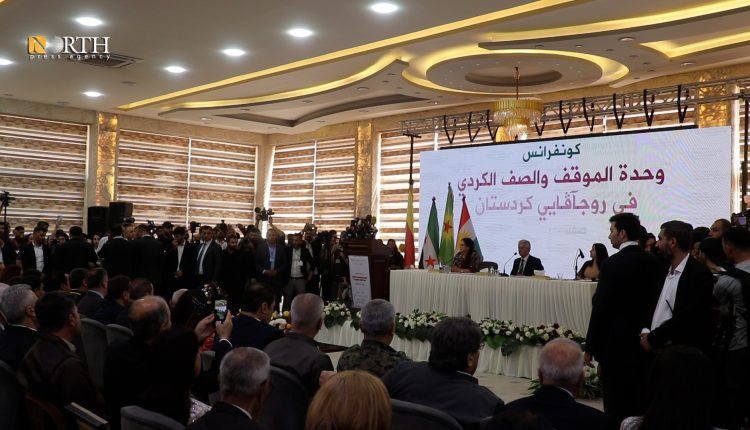
QAMISHLI, Syria (North Press) – A political document issued during the Kurdish Unity Conference, held on April 26 in Qamishli, northeastern Syria, called for the constitutional recognition of the Kurdish people’s national identity and the guarantee of their rights within a federal Syrian framework. The document also proposed unifying Kurdish regions as an integrated administrative and political unit within Syria.
The conference, held under U.S. and French sponsorship, put forward a set of national Syrian demands—including proposals on governance, economic justice, and constitutional reform—alongside Kurdish-specific rights.
However, the initiative quickly drew controversy. The Syrian Presidency issued a statement declaring that the outcomes of the conference contradicted the existing agreement between Damascus and the leadership of the Syrian Democratic Forces (SDF). The announcement sparked widespread media debate and speculation on whether the Kurdish movement was signaling an intent to secede.
Meanwhile, in Turkey, the reaction was swift. Devlet Bahçeli, head of the Turkish Nationalist Movement Party (MHP), condemned the conference as a threat to Syria’s territorial integrity, accusing the event—organized by the Democratic Union Party (PYD) and the Kurdish National Council (KNC) with Western backing—of producing resolutions aimed at division.
National demands misrepresented
Midas Azizi, a Kurdish politician who participated in the conference, described the backlash as baseless fabrications. Speaking to North Press, Azizi said the Syrian Presidency’s response misrepresented the Kurdish political vision, which in fact addressed broad national issues including the resolution of the Kurdish question, human rights, women’s and children’s rights, and a shared future for Syria.
He stressed that decentralization is not a uniquely Kurdish demand but a widespread national call. According to Azizi, there is a clear insistence on demonizing Kurdish demands, despite their alignment with the broader interests of Syrian society.
Azizi emphasized that Kurds are an integral part of Syria and that their demands should be considered national in nature. He urged democratic forces within Syria to support such calls rather than oppose them, warning that recent media campaigns sought not to engage with the content of the Kurdish vision, but to undermine the idea of Kurdish unity itself.
He concluded that Kurdish unity is essential—not only for shaping Kurdish policy but also for defining Syria’s future political structure.
Ill-timed initiative
On the other hand, Syrian political analyst Mohammad al-Omari criticized the timing of the conference. He argued that the Kurdish demands, though legitimate in many respects, risk undermining ongoing negotiations between Damascus and the SDF, particularly efforts to integrate the SDF into the Syrian national army and restore state sovereignty in the northeast.
Al-Omari emphasized that such demands must be raised within a comprehensive national dialogue and formal constitutional processes. “No Syrian group can impose its vision on others without collective national agreement,” he said.
He cautioned against using the conference’s demands as political leverage, warning this could provoke similar demands from other groups and derail the path toward a negotiated settlement.
While he acknowledged that many of the conference’s themes—such as decentralization and federalism—are positive in principle, he insisted they should be left to the collective will of the Syrian people. Otherwise, he said, the proposals risk being perceived as unilateral and exclusionary.
Al-Omari noted that similar ideas have previously been voiced by the SDF but have consistently faced resistance from the Syrian regime and segments of society committed to maintaining a centralized state structure.
These critics have instead called for enhanced local governance under Syria’s Local Administration Law, as a means to reduce bureaucratic inefficiencies without altering the country’s political unity.
He warned that Kurdish insistence on the conference outcomes could jeopardize the fragile agreement between Damascus and the SDF, invite regional intervention, and potentially escalate tensions—especially with Turkey and its allied Syrian factions.
A Roadmap for a shared future
In contrast, Sihanok Dibo, the Gulf representative of the Autonomous Administration of North and East Syria (AANES) and a conference participant, described the event as a vital step toward Kurdish political unification and a contribution to resolving the broader Syrian crisis.
He asserted that all the conference’s outcomes reaffirmed Syria’s unity and indivisibility, presenting instead a dynamic roadmap for national recovery. Dibo emphasized that the Kurdish political vision seeks to establish an inclusive Syrian identity grounded in the values and principles of a new Syrian republic.
He rejected claims of separatism, arguing that the vision’s emphasis on Syrian belonging refutes such allegations. “Rather than being met with opposition, these demands should be supported,” he said, adding that some actors continue to ignore the realities on the ground and instead perpetuate narratives of division.
Dibo concluded that the Autonomous Administration is working to overcome fragmentation and present a model of stability and continuity, allowing the Kurdish role in Syria’s future to be both constructive and integral.
